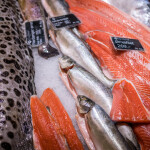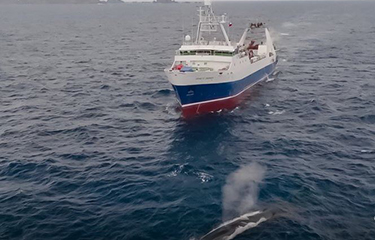The Sea Shepherd environmental conservation group has identified four krill-fishing vessels operating close to fin whale pods in Antarctica.
A video of the encounter, which occurred in March 2023, shows the Shen Lan and the Antarctic Endeavor fishing very close to fin whales. Sea Shepherd said it spotted another two trawlers in the area, but both hauled up their nets and left the area upon the arrival of the Sea Shepherd’s Allankay in the area.
“The two super trawlers made no effort to change course. It even appeared as if they deliberately steered toward the spouting megapod, knowing that where there are whales, there must be krill,” Allankay Captain Peter Hammarstedt said in a press release.
In March, Sea Shepherd Global launched Operation Antarctica Defense, geared toward monitoring the krill-fishing fleet in the Southern Ocean. The group is working with the Australia-based Bob Brown Foundation to investigate the krill supply chain.
The Antarctic Endeavor is owned by Deris, formerly Pesca Chile. The Shen Lan was launched in 2019 and is operated by the Jiangsu Shen Lan Distant Water Fishing Co., which delayed its construction of a second krill-fishing vessel in April 2022, citing the economic impacts of the Covid pandemic.
Around a dozen vessels from China, Norway, South Korea, Ukraine, and Chile currently fish four permitted open areas off the Antarctic Peninsula. Environmentalists and sustainable fishing advocates have expressed concern the entrance of new vessels into the fishery could push the annual krill catch above the 620,000-metric-ton maximum allowed by the Commission for the Conservation of Antarctic Marine Living Resources (CCAMLR), which sets the total allowable catch at two percent of the total stock of Antarctic krill. Those fears have been exacerbated by a 2016 study in the journal Geophysical Research Letters, which found warmer waters and increased ice melt could drive krill numbers down about 30 percent by the end of the century.
In January 2022, a research project led by scientists from Stanford University and Lindblad Expeditions sighted four commercial krill trawlers fishing near a pod of an estimated 1,000 fin whales northwest of the South Orkney Islands. Their research paper, “Commercial krill fishing within a foraging supergroup of fin whales in the Southern Ocean,” published in Ecology in February 2023, questioned whether CCAMLR is fulfilling its responsibility of ensuring that krill predators are not harmed by commercial fishing.
“The potential for industrial-scale krill harvesting to disrupt the positive feedback loop in ocean productivity, yielded by the dynamic interplay between phytoplankton, krill, and whales warrants further evaluation by CCAMLR and the International Whaling Commission,” the paper’s six authors wrote. “CCAMLR can use its management mandate to protect krill-dependent predators, including baleen whales, from adverse interactions with the krill fishery. Ultimately, more research is needed to quantify how commercial krill harvesting alongside foraging predators will impact whale and krill recovery in the 21st century.”
In 2021, Sea Shepherd documented the deaths of three whales in krill trawl nets in three separate incidents. It said both the direct impacts of krill fishing and its indirect impacts are having a profound impact on marine mammal populations in Antarctica.
“We are seeing sharp declines in humpback whale pregnancies, a decrease in the body mass of fur seals and a plummeting of chinstrap penguin populations. All three species depend on krill as a primary food source. All while climate change has reduced both the amount and duration of the sea ice that krill need to survive,” Hammarstedt said.
Krill are used in krill meal, a feed additive in the aquaculture industry used to color farmed Atlantic salmon, as well as for krill oil used in omaga-3 dietary supplements.
Photo courtesy of Sea Shepherd







